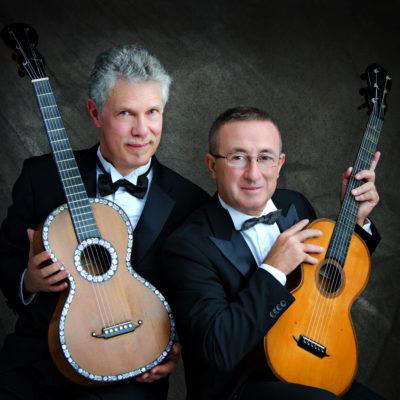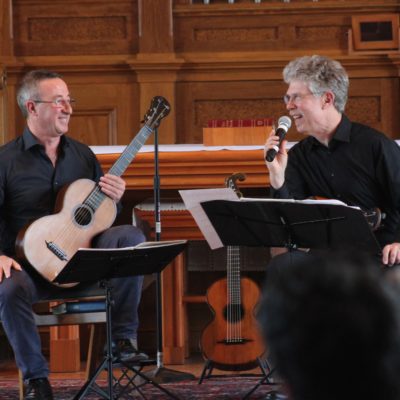|
|
|
|
Rucco-James Duo to evoke 19th century ethos in
March 19 concert -
Program
By Paul Bonner (from the recent TGS
Newsletter emailed to members)
And the end of all our
exploring
Will be to arrive where we started
And know the place for the first time.
— T.S. Eliot, Little Gidding
The guitar music everybody knows remains in some
ways hidden to us, behind two centuries of reinterpretation and evolution of the
instrument itself.
All that modern accretion the duo
of Pasquale Rucco and Douglas James will strip away to reveal the glory of what
many regard as the guitar’s first great golden age, in a TGS concert March 19 at
7 p.m. on Konnectclub.com. Tickets are
$12; half-price for current
TGS members (join or renew on line).
The Rucco-James Duo has long
engaged in a quest, in fact, for the essence of historically informed
performance of the early Romantic period’s repertoire. They play period and
reproduction guitars, strung with gut. Their performances are informed by a
combined two lifetimes of research into the period’s musical life and an
enduring run of concertizing together.
Their collaboration represents, moreover, the
convergence of a global journey, with Rucco coming over the seas from his home
in Naples, Italy, and James from over the North Carolina mountains from Boone,
where he is a professor of guitar at Appalachian State University. They are
playing a series of concerts in the United States this spring, beginning in
Annapolis, Md., on March 12 and ending with the performance for TGS on the 19th,
which will be webcast on Konnectclub live from TGS President Randy Reed’s Chapel
Hill home.
Their partnership began when both
were students of Carlo Barone, an Italian classical guitarist, expert on
Romantic guitar performance practice, and director of Accademia l’Ottocento,
which documents and publishes music of the period. It took place in Stresa, a
resort town on Lake Maggiore in northern Italy.
“And we started our activity first
over there,” Rucco said in an joint interview recently. “Then I invited Doug to
the Naples area for some concerts, and he invited me to....” “Tucson, in
Arizona,” James supplied.
They also concertized in northern
Italy and then all over Europe and the United States.
“It was easy because Douglas is a
very good friend, kind of a brother for me,” Rucco said. “We enjoy each other.
He likes to stay in Italy, I like to stay in America, so we decided to become a
duo. And here we are.”
“We’ve been playing as a duo now
for 27 years,” James added.
 |
| Douglas James, left, and Pasquale Rucco play March 19 |
Both men’s solo and pedagogical accomplishments
also are remarkable. At App State, James also directs the Appalachian State
GuitarFest, which celebrates its 25th “Silver Edition” this spring (see Also of
Note on page 5). James has won top prize in the Arturo Toscanini Solo Guitar
Competition in Italy and has been twice awarded a National Endowment for the
Arts Solo Recitalist Fellowship. He has recorded a solo album of Italian early
Romantic guitar music.
Rucco also has won the Arturo
Toscanini Solo Guitar Competition and several other European guitar
competitions. He is the founding director of a consortium of music academies in
and around Naples.
Together, the duo has recorded two
albums, A Night at the Opera and Early Romantic Music for Two Guitars. Among
their many performance venues have been the Guitar Foundation of America,
Guitar-Festival Iserlohn, Stetson International Guitar Summer Workshop, Sorrento
GuitarFest, Oberlin Conservatory, the Cleveland Institute of Music, and Early
Music Houston.
 |
In the concert, James will play primarily a guitar
in the French Mirecourt style made by luthier Jacques Derazey between 1830 and
1836, ornately inlaid around the binding and sound hole with mother of pearl.
“This would have been sold in Paris
during Fernando Sor’s time there,” James said.
He’ll also be using a 10-string
guitar from the 1840s made by Johann Anton Stauffer. It is characterized by a
relatively thin body, a fretboard that floats above the top, and a neck
adjusting screw in the heel that is turned with a clock key.
(Modern American guitarists may
better identify with Stauffer through the legacy of his father, Johann Georg
Stauffer. Specifically, they probably recognize at least the name of the elder
Stauffer’s young apprentice in Vienna who later emigrated to America and in 1833
began building guitars under his own name: C.F. Martin.)
Rucco will be playing another
Mirecourt-style guitar from the same period or slightly later. And he’ll use a
reproduction of a period terz guitar made by South Carolina guitarist-luthier
James Buckland. A terz guitar is smaller than a standard guitar and tuned a
minor third higher. Many duo compositions from the period feature the
combination of a standard and terz guitar, James explained.
Often, the duo emulates a soloist
with orchestral accompaniment, with many based on well-known operatic arias. The
melodic part is played by the terz guitar and the accompaniment on the standard
guitar.
“As an Italian, you understand
easily, my culture is particularly the opera, so I was growing up between
[Gioacchino] Rossini, [Giuseppe] Verdi, and [Giacomo] Puccini,” Rucco said. “And
this is what we are trying to do: to present the music of the 19th century for
guitar in the same quality and with the same dignità, we say in Italian —
elegance and fascination — of the opera music.”
The program may include the Grand Duo, Op. 31, No. 3,
by Antoine de Lhoyer; two Rossini aria adaptations by Anton Diabelli; Rondeau
alla Pollacca, Op. 30 (from Guitar Concerto No. 1), and Variazioni Concertanti,
Op. 130, both by Mauro Giuliani; and an arrangement by Giuliani of the overture
of the Barber of Seville by Rossini.
Probably the least known of those
composers is Diabelli, who, however, was a major figure in the 19th century
music publishing world — he published
Romantic guitar revealed Ludwig van Beethoven’s (and
some of Giuliani’s) compositions — and was an accomplished guitarist and
composer for the instrument in his own right.
Besides operatic adaptations,
another typical form is the grand duo, a concertante style that could often
feature guitar and another instrument, or two guitars.
“The de Lhoyer is the last movement
of one of three grand duos that he did, big duo pieces,” James said. “And it’s
an allegro-rondo, so it’s just a nice, lively opener.”
The period’s musical style could be called mannered,
and some proficiency in it would have been considered among the social graces of
a genteel person or aspirant to that status.
“At that time, every family of medium-high level in
the society needed to have someone that was able to play, in a good quality, an
instrument,” Rucco said. “And the guitar was one of the favorites at that time.”
Yet it would be a mistake to
consider this music merely polite or facile. Several works on the program, for
example, are each over 10 minutes long, with many intricate variations that
impose considerable demands on the player, James noted.
“There is certainly a misconception
that has been around for a while that the 19th century music is light and maybe
inconsequential,” James said. “But I would also say its kind of hard to play —
‘Let's hear you do it’ would be my response. Then it’s like, ‘Well, I don’t play
that stuff.’ It’s like a pianist saying they don’t play Beethoven.”
And just as no modern pianist,
without study and practice, possesses the required touch and sensibilities to
perform on an early 19th century fortepiano, a guitarist, even if adept at
playing the modern instrument, would have to make many adjustments to play a
period guitar well.
“They don’t respond the same way;
they don’t sound exactly the same way,” James said. “And you have to treat them
on their own terms.”
Put another way, shredding on these
guitars is always at hand — literally.
“You can’t play a gut string
exactly the same way you play a nylon string, or you’ll shred it instantly,”
James said. “So there’s all sorts of things to consider.”
In that and other ways, TGS members
and others tuning in to the March 19 concert will get to hear these pieces in
much the way audiences would have in a Parisian salon of the early to mid-19th
century.
“We feel pretty confident that we’re presenting it in
the way it would have been done,” James said.
|
© 1998-2022 Triangle Guitar
Society, Inc. is a 501(c) (3) non-profit organization.
|